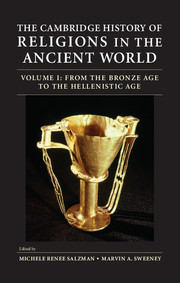Book contents
- Frontmatter
- Contents
- List of Figures and Maps
- List of Contributors
- List of Abbreviations
- Acknowledgments
- Introduction to Volumes I and II
- Introduction to Volume I
- Part I Mesopotamia and the Near East
- Part II Egypt and North Africa
- Part III Greece and the Eastern Mediterranean
- Part IV The Western Mediterranean and Europe
- Suggestions for Further Reading
- General Index
- Index of Citations
- Frontmatter
- Contents
- List of Figures and Maps
- List of Contributors
- List of Abbreviations
- Introduction to Volume II
- Part I Iran and the Near East
- Part II Egypt and North Africa
- Part III Greece and Asia Minor
- Part IV Italy, Roman Gaul, and Spain
- 14 Religion in Rome and Italy from the Late Republic through Late Antiquity
- 15 Judaism in Italy and the West
- 16 Christianity in Italy
- 17 Religions and Cities in Roman Gaul (First to Fourth Centuries CE)
- 18 Christianity in Gaul
- 19 Religions of Roman Spain
- Suggestions for Further Reading
- General Index
- Index of Citations
- References
18 - Christianity in Gaul
from Part IV - Italy, Roman Gaul, and Spain
Published online by Cambridge University Press: 05 October 2013
- Frontmatter
- Contents
- List of Figures and Maps
- List of Contributors
- List of Abbreviations
- Acknowledgments
- Introduction to Volumes I and II
- Introduction to Volume I
- Part I Mesopotamia and the Near East
- Part II Egypt and North Africa
- Part III Greece and the Eastern Mediterranean
- Part IV The Western Mediterranean and Europe
- Suggestions for Further Reading
- General Index
- Index of Citations
- Frontmatter
- Contents
- List of Figures and Maps
- List of Contributors
- List of Abbreviations
- Introduction to Volume II
- Part I Iran and the Near East
- Part II Egypt and North Africa
- Part III Greece and Asia Minor
- Part IV Italy, Roman Gaul, and Spain
- 14 Religion in Rome and Italy from the Late Republic through Late Antiquity
- 15 Judaism in Italy and the West
- 16 Christianity in Italy
- 17 Religions and Cities in Roman Gaul (First to Fourth Centuries CE)
- 18 Christianity in Gaul
- 19 Religions of Roman Spain
- Suggestions for Further Reading
- General Index
- Index of Citations
- References
Summary
Christianity, as Sulpicius Severus observed circa 400, “was taken up rather late across the Alps” (Chron. 2.32.1). Indeed, it was not until the reign of Marcus Aurelius that Gallic Christians entered the literary record. Their first appearance, however, was spectacular, both literally and figuratively, for it occurred in the vivid narrative of persecution that opened book five of Eusebius’s Church History and both followed and illustrated a prominent statement of historiographical intent. Eusebius based his account on a letter written in Greek by “the servants of Christ sojourning in Vienne and Lyon” to “the churches in Asia and Phrygia” whose purpose was to supply a biblical and theological frame for events that had occurred at Lyon circa 177. Excerpted for the purpose of the narrative and significantly redacted, the letter must be read with caution, but even so, like other documents used by Eusebius, it supplies credible details not available elsewhere.
Despite the arrest of some Christians from Vienne (Hist. eccl. 5.1.13), notably “Sanctus, the deacon” (5.1.17) – probably because they were in Lyon at the time – the persecution appears to have arisen from local conditions. As metropolitan capital of Gallia Lugdunensis, site of the altar of Rome and Augustus, and federal capital of the Three Gauls, Lyon was not only an obvious venue for early Christian missionary activity, but also a likely place for confrontation over the state religion. Suspected of atheism and impiety (5.1.9), perhaps in connection with their refusal to participate in celebrations of imperial victory,Christians were barred from public places (5.1.5), denounced to the local authorities (5.1.8), and brought before the governor. He condemned to death those who admitted to being Christians and released those who denied it. Having so far followed the precedent set by Trajan (Pliny the Younger, Ep. 10.97), he then went beyond it by affirmatively searching for Christians (Hist. eccl. 5.1.14).
- Type
- Chapter
- Information
- The Cambridge History of Religions in the Ancient World , pp. 484 - 509Publisher: Cambridge University PressPrint publication year: 2013



